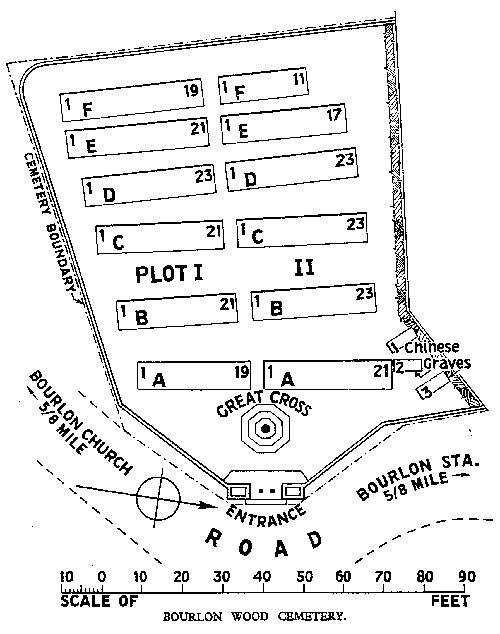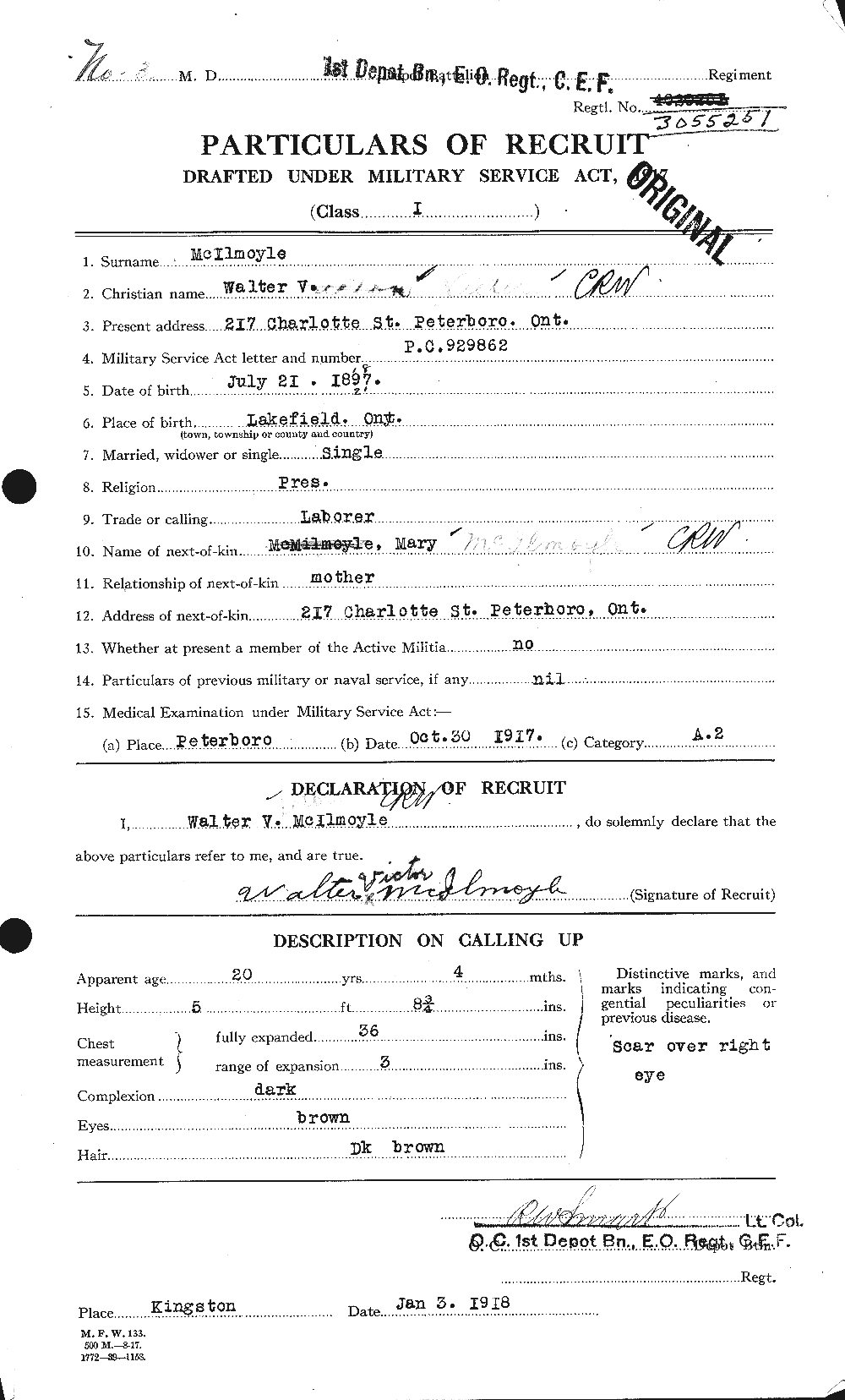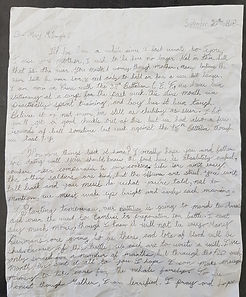

Walter Victor McIlmoyle
In Memory of Pte.

The 38th Battalion
The 38th Battalion, C.E.F of WW1 was a unit of the Canadian Expeditionary force. It started in Ottawa, with 5 officers and 251 others. Through this battalion, approximately 4,500 men had passed through. About 700 men were killed, and 2,000 were wounded. The members of the battalion had earned almost 300 decorations in total. Two of which had earned Victoria Crosses: Major Thain Wendell MacDowell (Vimy Ridge) and Private Claude Joseph Patrick Nunny (Drocourt-Quéant), who was also the only Canadian soldier to win the V.C., D.C.M., M.M award. On June 24, 1915, the battalion was sent to England. The battalion, on August 1, 1915 boarded the Caledonian ship, from Montréal to Bermuda, arriving on the 12th of August. At this point, the battalion was 35 officers, and 959 other ranks. The battalion later, aboard the Grampian ship travelled from Bermuda on May 30, 1916 to England, arriving on the 9th of June, 1916. The battalion had now grown to 35 officers, and 1001 other ranks. On August 13, 1916 the battalion had become part of the 4th Canadian Division, of the 12th Canadian Infantry Brigade, when arriving at France. From then on, the battalion reinforced by the 7th Canadian Reserve Battalion between 1917-1919 had fought in France, before later returning to England on May 6, 1919, then to Canada on June 3, 1919, disbanding on September 15, 1920, by General Order 149.

Picture of the 38th Battalion
The 38th Battalion earned battle honours in:
-
The Somme (1916)
-
Ancre Heights
-
Ancre (1916)
-
Arras (1917-1918)
-
Vimy (1917)
-
Ypres (1917)
-
Passchendaele
-
Amiens
-
Scarpe (1918)
-
Drocourt-Quéant
-
Hindenburg Line
-
Canal du Nord
-
Valenciennes
-
Sambre
-
France and Flanders (1916-1918)


Patch of the 18th Battalion
Captain's Badge
Walter Victor McIlmoyle, son of Mary Louise Clarke Renzetti (1875-1949) and Nathan McIlmoyle (____-1900), was born on the 21st of July, 1897 in Lakefield, Ontario, Canada, and died on September the 29th of 1918. Walter was the 3rd of 4 siblings: Hannah Margaret McIlmoyle Godfrey (1893-1952), Willian John McIlmoyle (1894-1974), Walter Victor McIlmoyle (1897-1918), and Helen McIlmoyle Downey (1900-1957). He lived at 217 Charlotte St. Peterborough, Ontario with his parents, worked as a laborer, and was of the Presbyterian religion. Going into the war, he was at the age of 20 years, and 4 months. He had a dark complexion, dark eyes, and dark brown hair, alongside a height of 5 feet and 8¾ inches, and a scar over his right eye on his medical exam, which took place in Peterborough, Ontario on October the 30th of 1917. He was later cleared for service in Kingston, Ontario in January, the 3rd of 1918. Walter McIlmoyle, when going into the war, did not have a choice. Under the War Measures Act, Walter Victor McIlmoyle was a conscript and drafted into the war.
Biography
Walter was drafted to the 38th battalion of the 1st Depot Battalion, Eastern Ontario Regiment, Canadian Expeditionary Force (1st Depot Bn., E.O. Regt. C.E.F.). After about 4 months of training, Walter was taken on strength (added to the military organization) on the 12th of June, 1918. He was sent to join the unit in the field on the 17th, and arrived and joined the unit the day after. Upon arrival, Walter and the battalion trained for the remainder of the month. Up until the 19th of July, the battalion went to the front line, just North of Arras, France, staying there until August the 2nd. Walter was later part of the attack in the Gentelles Woods (East of Amiens) which lasted from August 7-13. They assembled for the attack on the night of August 7, 1918, and captured Cayus Wood, which was held until the 9th, when the battalion later advanced to Rosières. By the 11th, a line had been made in proximity to Chili. The battalion later came in contact with the Germans, who had launched a counterattack, which was repelled. The fighting had lasted until the night of the 13th when the battalion was also relieved. The battalion had played a major role, advancing 22,000 yards, and capturing 167 guns, 1,000 machine guns, and 10,000 prisoners. The casualties were very great, but Walter was not injured.
During early September, Walter was part of the attacks on the Canal du Nord in France. By the 3rd, the battalion had broken the Drocourt-Quéant Line, capturing hundreds of prisoners and many weapons consisting of mortars and machine guns, though losing 300 men in total. For the rest of the month until the 25th, Walter alongside the battalion had trained. On the 25th, they started their advance to their assembly position for the attack on Cambrai, which they reached the following day. The battalion’s objective was to capture the railway near Bourlon, which was fought for on the morning of the 27th. They then crossed the Canal at Inchy, which was successful, until noon, when they were stuck in opposition. After the day ended, the battalion had successfully captured an assortment of weapons and 200 prisoners. On the 28th, the battalion captured positions in Marcoing Trench, but at the loss of their Lieut. Col. Gardner, who was in charge. On the 29th. The day Walter Victor McIlmoyle was killed, the battalion’s task was to cross the Douai-Cambrai Road. That fateful day, almost all the officers and Non-commissioned officers (NCOs) of the battalion were either killed or wounded alongside Walter. Over the course of the 4 days: September 26-30, the battalion went in 570 strong, and came out with 96. The battalion was later relieved, after gaining the objective.
In total, Walter Victor McIlmoyle had served for 9 months and 29 days. Not only did he die the same year he was drafted but did so a mere 4 months before World War I had ended at the age of 21. On his will, Walter had transferred all his money earned, which was $20 a month, to his mother. Private Walter Victor McIlmoyle will indeed be remembered for his services in the war, and the sad story he has lived.
Photograph of Walter Victor McIlmoyle

Grave Reference


Walter Victor McIlmyle's grave is located in Bourlon Wood Cemetary in Bourlon Village, Pas-de-Calais, France.
Grave reference: 11.B.4.

Particulars of Recruit




Letters
NOTE: These letters are not authentic.
